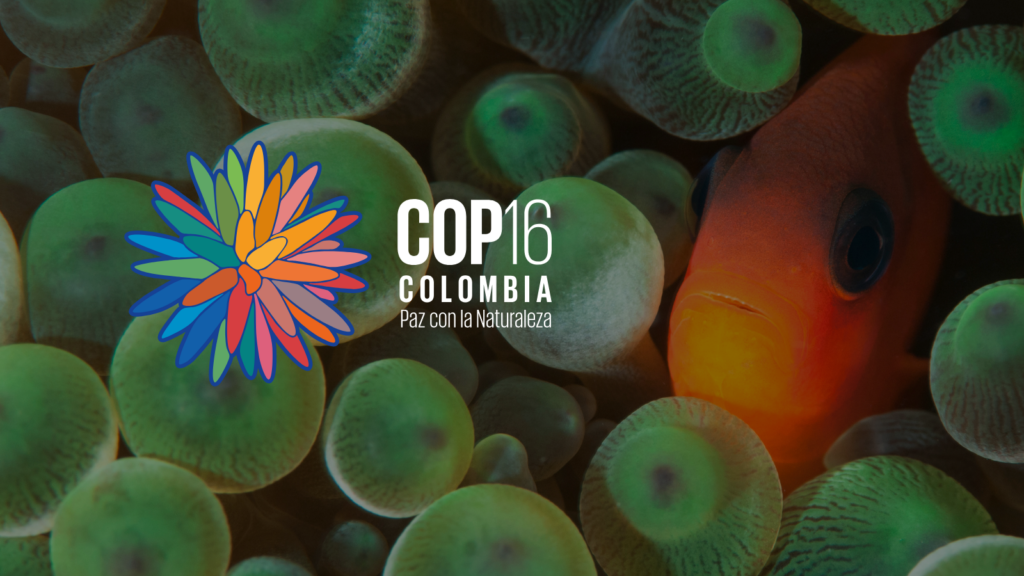The Sixteenth meeting of the Conference of the Parties to the Convention on Biological Diversity (COP16) is taking place in Cali, Colombia from 21 October to 1 November 2024. It marks the first Biodiversity COP since the adoption of the Kunmig-Montreal Global Biodiversity Framework (GBF) at COP15 in 2022.

During this COP16, governments will be tasked with reviewing the state of implementation of GBF – a framework that sets out an ambitious pathway to reach the global vision of a world living in harmony with nature by 2050.
The ocean is the largest ecosystem on our planet, home to a significant part of the Earth’s biodiversity. Its health and conservation are critical to achieving global biodiversity goals at COP16. However, increased pressures from human activities and climate change are driving critical changes in the ocean, making urgent action necessary to protect its biodiversity and meet the GBF targets. Effective management relies on what we can measure, and data-driven ocean action depends on sustained ocean observations and data accessibility.
GOOS: Critical infrastructure to support GBF targets
Among the key elements of the GBF are 4 goals for 2050 and 23 targets for 2030, and the UNESCO-IOC led Global Ocean Observing System (GOOS) plays a vital role in supporting several of the targets and indicators with knowledge from the marine realm.
Since 2012, GOOS has been engaged in building the networks for marine biological and ecosystems observations. Coordinating these observations around a set of Essential Ocean Variables (EOVs), GOOS provides a comprehensive framework to effectively monitor marine biodiversity. This enables parties to implement numerous GBF indicators, including 9 headline indicators under GBF Targets 2, 3, 6, 7 and 21 – from the extent of various natural ecosystems, to coastal eutrophication potential. The GOOS BioEco Metadata Portal, connected to and supported by the Ocean Biodiversity Information System (OBIS), ensures open access to metadata on the sustained biological observing programmes collecting the biological EOVs around the world.
During these two weeks of events and bilateral negotiations, GOOS will advocate for sustained ocean observations and invite parties to work together towards a truly integrated ocean observing system in support of the GBF.
Join GOOS at these COP16 side events:
22 October 2024
- Centering biodiversity in United States policy and international partnerships
10:00 – 11:30 | GEO BON Pavilion
This panel will present an overview of new policies and actions by the United States to center biodiversity in effective management and conservation, and will explore means of implementing these new strategies by collaboration and co-design across sectors and internationally toward a nature-positive future.
Organizers: Smithsonian Institution, NOAA, Lenfest Ocean Program
24 October 2024
- Implementing the Global Biodiversity Framework: How UN-Oceans can support States in meeting their obligations under the GBF with a focus on the ocean-biodiversity-climate nexus, including development and implementation of NBSAPs
16:30 – 17:50 | Sanquianga – GRULAC meeting room
This side event aims to focus on the GBF goals and targets related to the ocean-biodiversity-climate nexus, and showcase the most innovative and relevant work of UN-Oceans members, both individually and via inter-agency cooperation, that is contributing to implementation of the GBF. Using examples of past successes and achievements it will aim to hear from parties to the CBD on priority needs for future support in relation to the implementation of the GBF, and related global instruments and frameworks. It will address issues such as ocean observations, science, and data; transboundary species management; marine protected areas and other effective area-based conservation measures; nature-based solutions and/or ecosystem-based approaches, such as through enhancing marine and coastal resilience, protection and restoration; and linkages to a sustainable ocean-based economy.
Organizer: UN-Oceans
25 October 2024
- UNESCO-IOC: tools to support nations for ocean biodiversity conservation and management
12:30 – 14:00 | UN Colombia Pavilion
From ocean observations to data systems, prediction, policy and key ocean research into topics such as multiple ocean stressors impacting biodiversity, UNESCO-IOC provides different assets to help nations protect ocean biodiversity and better manage their ocean assets. The IOC is also the lead agency for the UN Decade of Ocean Science for Sustainable Development (Ocean Decade). This session will include a very brief overview of the range of UNESCO-IOCs support and tools, latest findings presented in the State of the Ocean Report, the Ocean Decade ecosystem and biodiversity goals, and then show these in action supporting biodiversity management through local examples.
Read more
Organizer: UNESCO-IOC
- Observing biology and ecosystems in the ocean for effective biodiversity conservation
10:00 – 11:30 | GEO BON Pavilion
This event will share the latest developments, including capacity development opportunities and challenges, concerning existing, new and emerging technologies and methods for observing biology and ecosystem Essential Ocean Variables (EOVs), including metrics for biodiversity and relevant environmental parameters. We aim to highlight their high potential for supporting the implementation of the Kunming-Montreal Biodiversity Framework.
Organizer: Partnership for Observation of the Global Ocean (POGO)
27 October 2024
- Ocean Day Session: Science and Technology for Action
14:30 – 15:30 | GBF Pavilion, Blue Zone
This session will discuss the role of ocean science and knowledge to support implementation of the GBF. It will explore the links across the ocean science value chain from observations to data to science and knowledge and the importance of ensuring sustained investment in capacity development and transfer of technology. It will showcase the work being carried out in the framework of the UN Decade of Ocean Science for Sustainable Development, and other initiatives as tangible examples of the role of science, knowledge and technology in implementation. The first segment of this informal “seaside chat” will explore the different elements of the ocean science value chain with speakers discussing the role of observations (POGO), data (INVEMAR), science (PML) and the ways in which they inform policy (DEFRA).
Organizers: UNESCO-IOC, Ocean Decade
